Hey y’all,
Meg bought me my fourth typewriter last week at the thrift store down the street: a 1975 Smith-Corona Super G. It’s not a great machine, but it’s fun and stylish, designed by Italian car makers. I spent a few hours this weekend playing with it, swapping out the ribbon and degunking a few keys.
I don’t go searching for typewriters. I let them come to me. I just buy whatever comes across my path that’s in good shape and reasonably cheap. (Before anyone asks: Yes, I’ve seen the documentary California Typewriter! It’s good fun.)
The first typewriter I bought is my least favorite: an electronic Smith-Corona from the 80s I picked up for $14 in 2019 while browsing at Goodwill. It’s ugly and loud and not shown.
Right before the pandemic, I bought my favorite: a 60s Smith-Corona Galaxie.
Last year, I bought an old 50s Royal Quiet De Luxe. Probably the best machine, overall, but it still needs a little work, so I don’t use it too often.
(Dear universe: please send me an Olivetti.)
One of my favorite literary disses comes from Truman Capote, who once bitched of writers like Jack Kerouac, “They’re not writers. They’re typists.”
Capote spit that in the 50s when my Royal was cutting-edge technology, designed to speed writing up. Today, typewriters seem like a perfect technology to slow writing down.
Here’s David McCullough:
I love the feeling of making something with my hands. People say, But with a computer you could go so much faster. Well, I don’t want to go faster. If anything, I should go slower.
I also use my typewriters to slow down, but I don’t use them to slow down my writing, I use them to slow down my reading.
One of my favorite ways to warm up in the studio is copying out good poems on the typewriter. Whenever I come across a poem I like, I type it. In the same way that biking can be a perfect speed between walking and driving, I’ve found that typing on a manual typewriter slows me down just enough to really pay attention to the words — and the line breaks! — of other writers. (This, by the way, is not a new idea: both Hunter S. Thompson and Joan Didion used to type out Hemingway stories to get a feel for his style. Copying is how we learn.)
What’s funny about this is that I grew up with an 1990s electronic Smith-Corona typewriter that let me type extremely fast. I’d use it for freewriting: I could type so fast on that machine that my keystrokes would get ahead of the actual type hits, and there’d be a magic moment of suspense between when I finished a sentence and when it appeared on the paper. I can’t think of anything else quite like it.
But back to non-electric, manual machines: It’s never lost on me how much my piano and my typewriter resemble each other: the infinite possibilities of a set number of keys in front of you. (And if you open up the machine, you can see how it works while you “play” it.) The piano and the typewriter are “digital” devices, in the sense that you use your digits to operate them. (David Sudlow wrote a whole book that compares playing the piano to typing on the typewriter: Talk’s Body: A Meditation Between Two Keyboards.)
Over the weekend, I wrote about how the writer is a composer and the reader is a musician. When I play Bach on the piano, I sometimes think to myself, no matter how bad I’m playing, I am putting my fingers on the same keys as Bach! He wrote these notes down 250 years ago, and now I am playing them! The same is sort of true when I copy out poems (or read them out loud): I’m playing the poem, in a way, putting my fingers on the words the writer wrote down.
Last month I recommended my practice on Twitter and writer Laura Lippman responded, “OH MY GOD I'M GOING TO DO THIS RIGHT NOW.” She really took to it and said, “I want to do this every day… In 2021 I tried to memorize poems, but I felt the time was disproportionate to the task. This, however — this is magical.” She tells me she now has a whole journal dedicated to her typed poems.
Laura and I sometimes tweet the poems we’ve typed to each other and I got to wondering if maybe there could be a social component to this. Maybe I could type up my favorite poems and send them to my friends. The only problem is, like Laura, I like to keep the poems I type and stick them in my diary…
Then I got to thinking… this is what carbon copies are for! In the old days, you could use carbon paper to make instant copies of whatever you were typing. People would often type a letter and save a copy for their own files. (When you “cc” someone on an email, that comes from carbon copies.)
Just buying carbon paper seemed a little boring to me though, somehow, and most of the poems I like tend to fit on a little skinny piece of paper. So I had a little flash of inspiration: What if I bought a bunch of those pads that waiters use to take your order in restaurants? These are actually made of “carbonless copy paper,“ but they work on the same principle: the pressure from writing (or typing) creates a copy on the second piece of paper.
It worked better than I even expected! And the thing I love about this is you end up with a “Guest Check” and a ”Kitchen Check.” One for me, and one for somebody else. (I love to imagine stringing a wire in a classroom or an office and clipping these checks to it the way restaurant staff do in a kitchen.)
Okay, I could go on, but I’m hitting a thousand words here, and y’all have work to do. (I didn’t even get into typewriter art or mail art or how much a typewriter is like a bicycle. Maybe a part two is in order...)
Would love to hear from y’all in the comments! Do you copy your favorite writing? Do you have a typewriter? Let us know:
I’m also going to post this to chat so we can share pictures of our typewriters!
xoxo,
Austin
PS. Here is a pile of books I’ll be studying for part two — let me know what I’m missing!





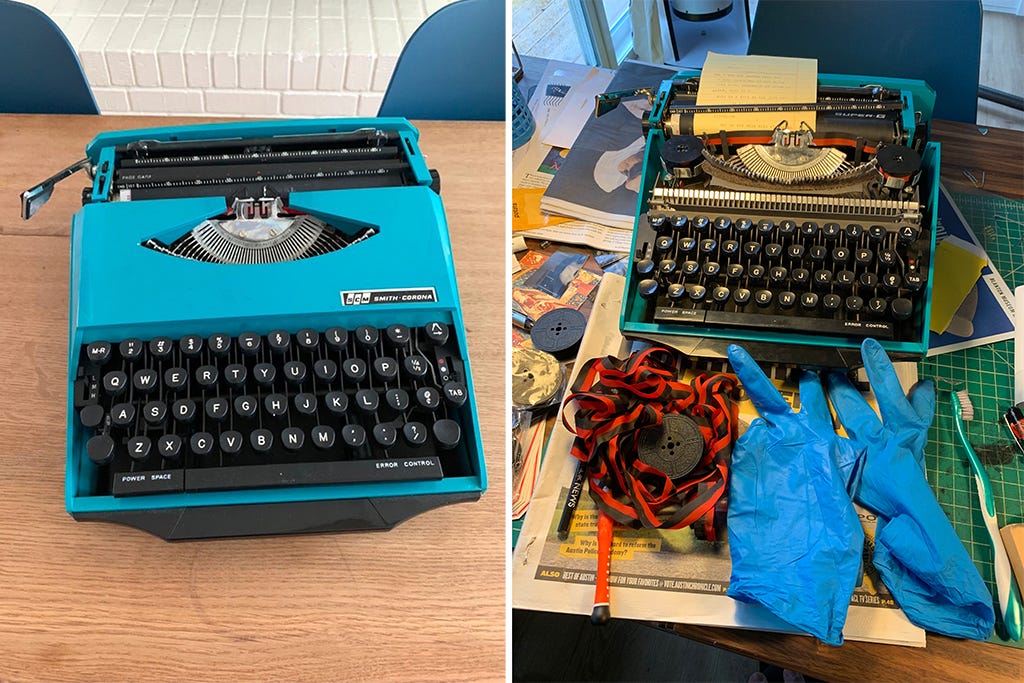
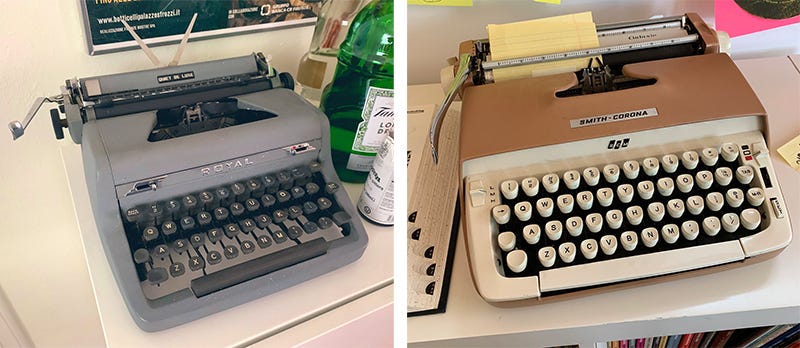
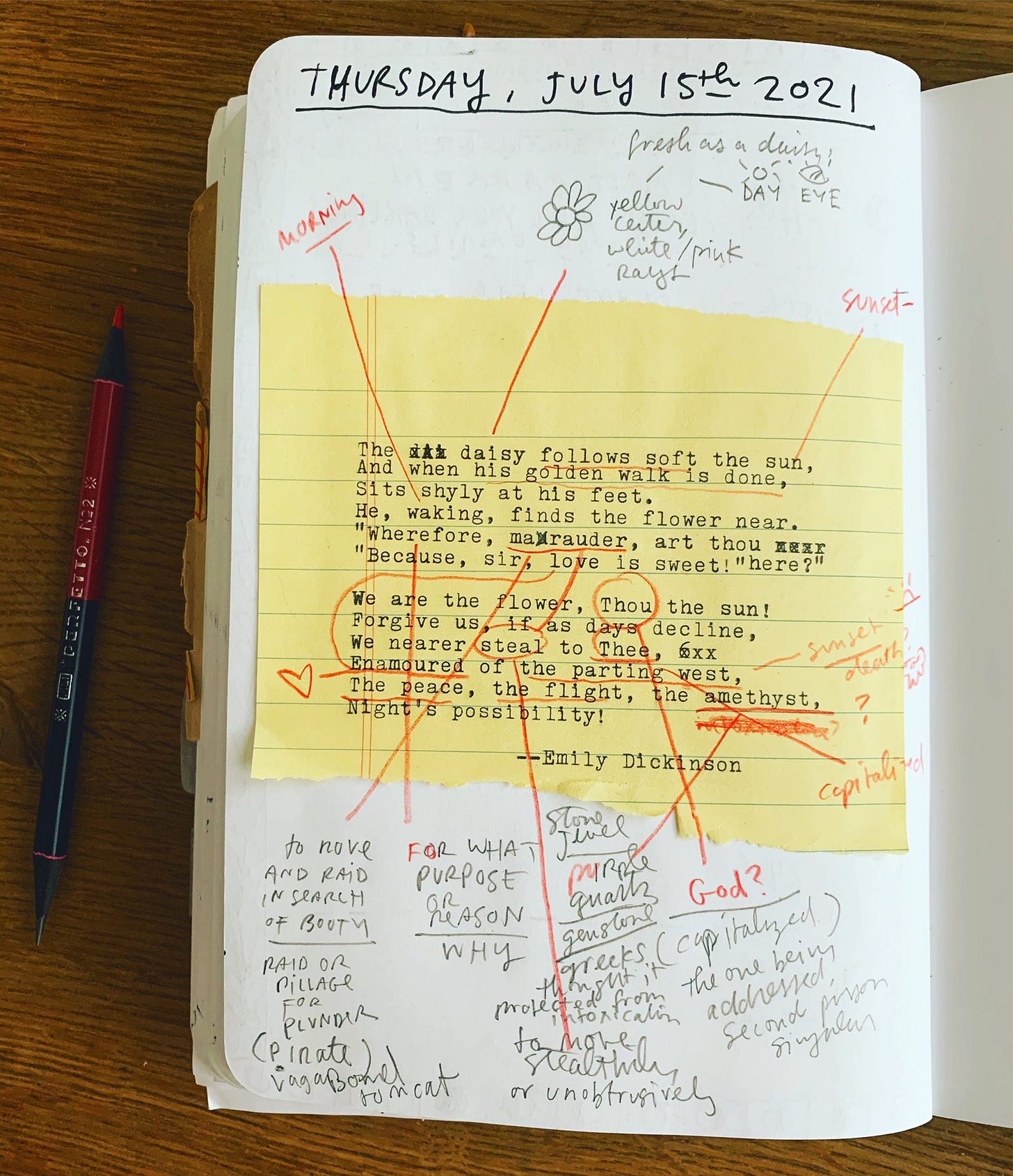
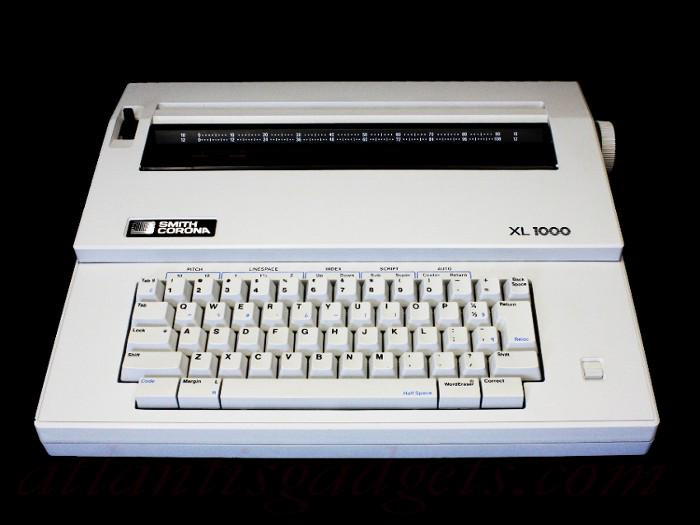

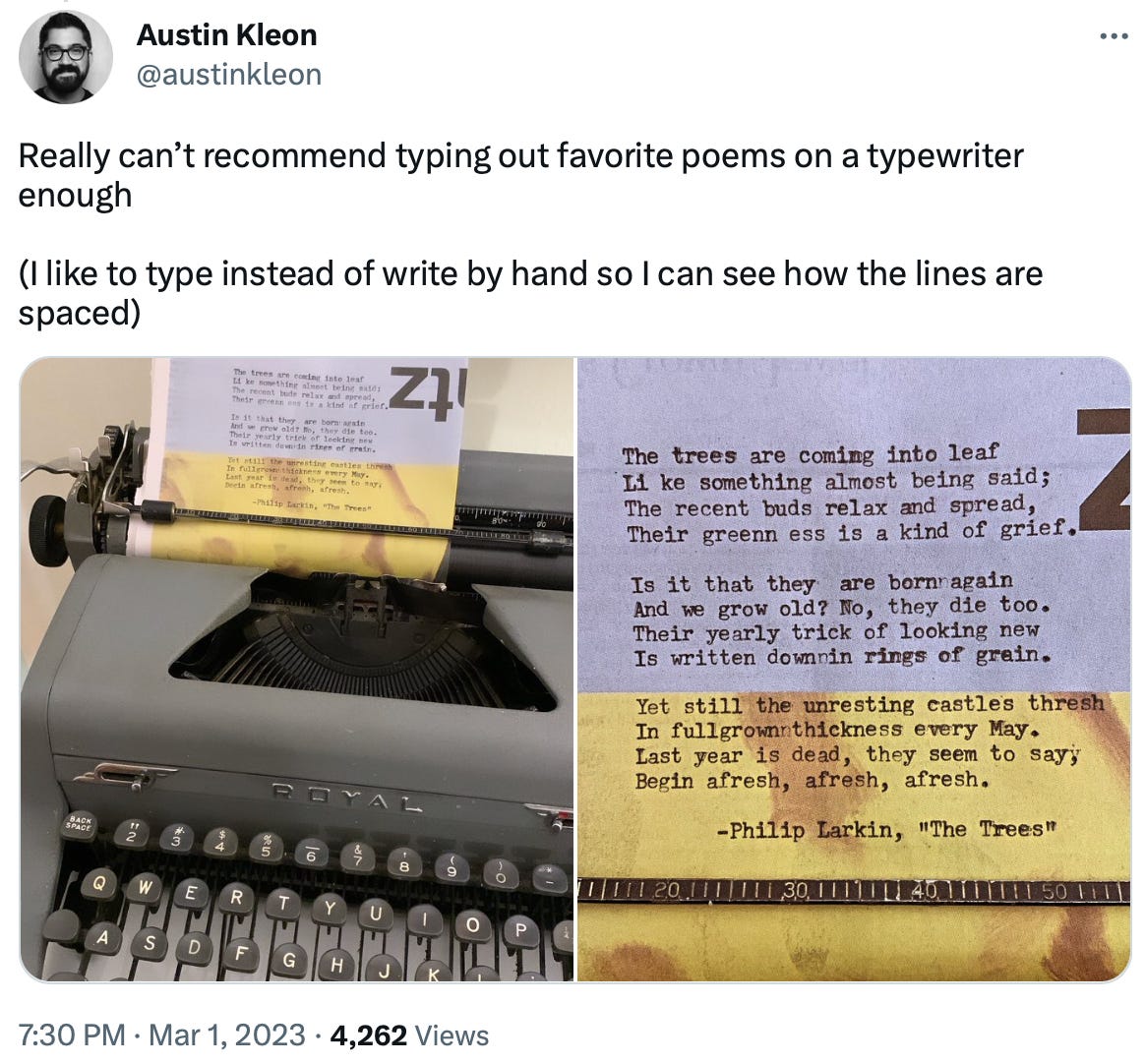
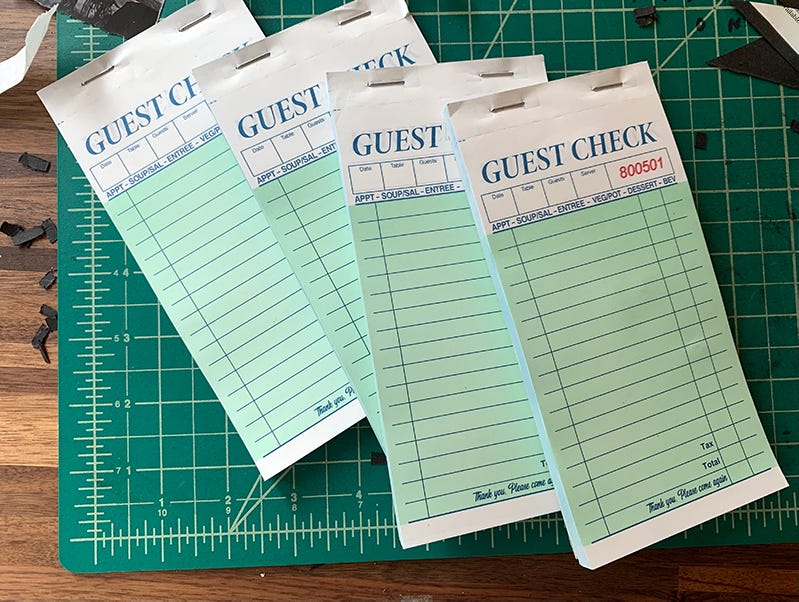
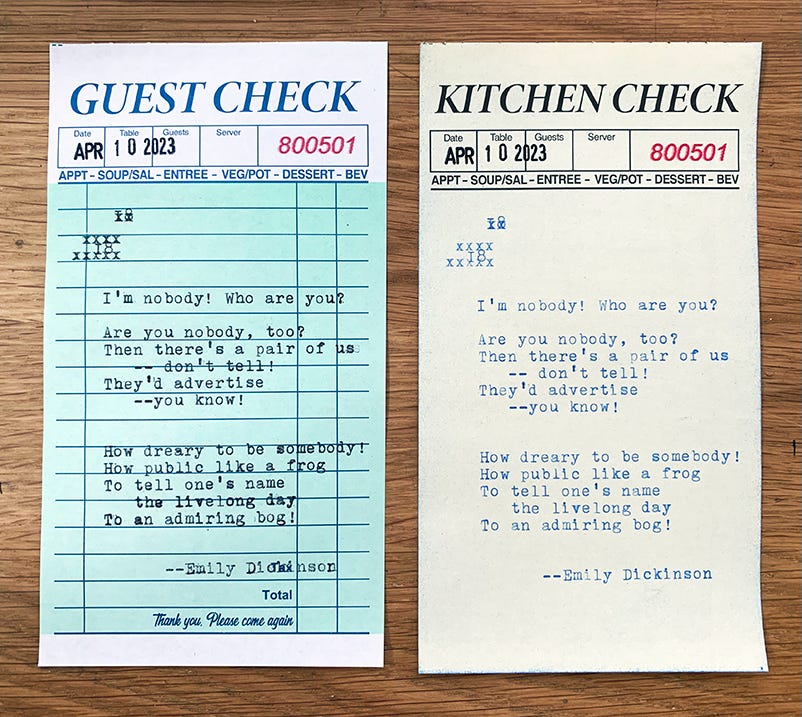
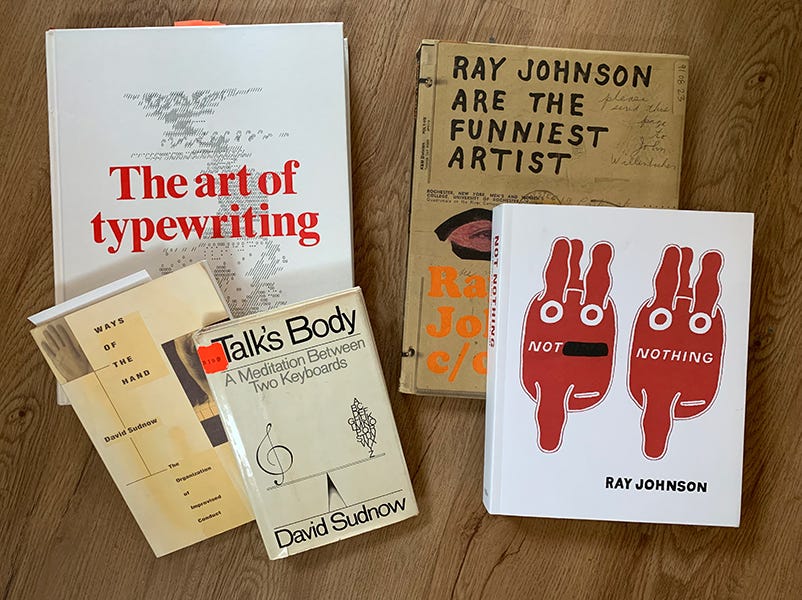
I turn 80 this year. In high school I took both the academic and the business track, which included two years of typing -- accuracy and speed drills in touch typing, and then learning the myriad forms of business correspondence and how to write a resume. This paid my rent and fed me for many, many years. On one Kelly Girl assignment I worked for a lawyer typing documents from his handwriting onto legal length paper with eight carbon copies. Because they would be entered into court records there could be no erasures whatsoever. After a rocky beginning I did learn to center my mind on the task of producing error free pages -- on a manual typewriter for eight hours a day. (My most boring job ever was to type checks, with carbons, on an electric typewriter -- also for eight hours a day'. Thankfully, that assignment lasted only six weeks.)
I have always nested comfortably in sentences and the words that make them, and respected the well stated thought. After two years of a liberal arts education, I followed my husband to a university town where I became a Typist I for a botany professor whose first language wasn't English. His scientific mind was clear to me though, so I freely rewrote whatever he handed me to type for journal publication and professional correspondence. I knew he would catch any errors I may have introduced, and would offer another way to clarify what he meant to say. In that job and others, even though I was a mere typist hired to regurgitate other people's thoughts into text form, I always felt responsible for every page that passed through my typewriter -- that it made sense, in itself and in the context of what had gone before and what followed.
One day I learned entirely by accident that there was such a thing as a technical writer, and I knew immediately that that was what I wanted to be. I went on to have a twenty year career in a large southern city, writing computer and software documentation. My very best work toward the end was writing for computer systems and network systems engineers. Knowing sense from nonsense took me a long way -- plus I graduated high school a few years ahead of the memo telling girls not to learn to type.
[GUEST CHECK + KITCHEN CHECK = BRILLIANT]
My mother, who grew up in Springfield, Missouri, was some sort of speed champion typist for the state of Missouri when she was in high school. She had a 1935 Royal with the little cannisters on each side that held the ribbon. I can't remember what her speed was--75 words per minute? but her fingers were big and strong (her hands were bigger than my dad's). You had to have strong fingers to push down those clunky keys. She gave me that typewriter when I went off to college and my roommates called it the Royale (accent on the last syllable, of course). I used it through the sixties and into the seventies, when my husband gave me an electric Smith Corona. It went fast--I could do over a hundred words a minute on it, but it had none of the charm of the Royal. One more short story. I was about four and my cat, Brownie, decided to keep her kittens in the carriage of the Royal. My mother, a little annoyed, said this was no place to put kittens, and she put them in a box with a blanket. But Brownie would have none of this. She would put them back in the typewriter. I was on Brownie's side. There was something cozy about that bed of keys.
I have a picture of a 1935 Royal, not ours, but one I found on Google. Where can I post it?